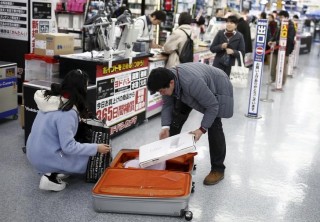Loading
Search
▼ Economy, Strong Yen Defuse 'Explosive' Chinese Shopping In Japan
- Category:Shopping
TOKYO — Chinese tourists spent less in Tokyo shops during the Lunar New Year holidays compared with a year earlier, retailers said, as a stronger yen and slower economic growth at home discouraged the kind of “explosive buying” that became a buzzword in 2015.
Isetan Mitsukoshi Holdings said its stores served around 50% more international duty-free shoppers during Feb 7-13 compared with the same holiday week last year due to a spike in customers from mainland China, but each spent 15% less than a year ago.
In 2015, visitors from mainland China doubled to five million from 2014, helping Japan’s overall tourist numbers reach nearly 20 million - a target the government had hoped to achieve by 2020. Shopping by Chinese tourists at department stores and electronics shops in 2015 created a buzzword, “bakugai”, or explosive buying, and came as a boon for Japanese retailers smarting from decades of sluggish demand from domestic consumers.
But China’s economic growth fell in 2015 to a 25-year low and stock markets slumped in the middle of the year, raising uncertainty about the outlook for the economy - impacting Chinese buying abroad this year.
Retailers in Sydney and Hong Kong have also seen Chinese tourists turn more budget conscious.
“Last year, they’d come in around five or 10 buses, park right nearby, and shop in groups. But that’s been rare this year,” said Katsuhito Takahashi, assistant manager at electronics store Yodobashi Camera in Shinjuku, a large shopping, entertainment and business area of Tokyo.
He said the store’s sales during the Lunar New year holidays fell around 25% from a year earlier, although Chinese customer numbers were more or less unchanged.
J.Front Retailing, which operates Daimaru department stores, said Chinese customers increased from a year earlier but sales per customer fell by a double-digit percentage.
“We did see customers trying and buying cosmetics, and purchasing children’s clothing and other necessities for the family,” but sales of jewelry and watches declined by double digits, a J.Front spokeswoman said.
Mizuho Research Institute chief economist Hajime Takata said the “bakugai” trend may be waning as China’s economic slowdown, the stock market fall and yen strength in January impacted buying.
“These factors may be leading to less spending per person,” he said.
In addition to shopping, Chinese tourists may be increasingly interested in experiences such as visiting museums or exploring Japan’s countryside, he said.
Yang Jiao, a 28-year old from Dalian in northeast China who was shopping in Shinjuku, agreed, saying she looked forward to buying cosmetics, but shopping wasn’t her main purpose.
“The quality of Chinese products meets our everyday needs,” she said. “As a young person, I think travelling is for gaining experience and knowledge, not merely for shopping.”
(c) Copyright Thomson Reuters 2016.
- February 25, 2016
- Comment (0)
- Trackback(0)


